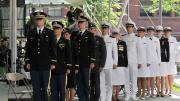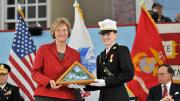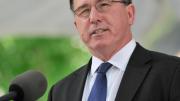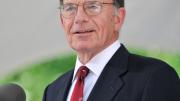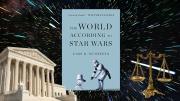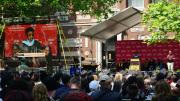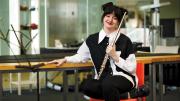President Drew Faust and a large, enthusiastic crowd of family members, friends, fellow students, alumni veterans, and other well-wishers gathered in front of Memorial Church late on the morning of May 26 for the commissioning ceremony for the Reserve Officers’ Training Corps Harvard class of 2010: a dozen U.S. Army, Navy, and Marine Corps cadets and midshipmen. Standing out among the audience were uniformed MIT cadets, scheduled to be commissioned a week later, who came to cheer the Harvard students they’d trained with, and former marine Farish Jenkins, now professor of biology and Agassiz professor of zoology, who chose to attend in doctoral robes to celebrate his students Karl Kmiecik, Christi Morrissey, and Shawna Sinnott—each joining a different branch of the service.
The cadets were greeted by former U.S. Senator Paul G. Kirk ’60—once an Army ROTC cadet himself—on behalf of the fiftieth reunion class. In accepting the extra challenges imposed by their demanding extracurricular choice, they had already demonstrated leadership, he said, and were first in their class to answer “a fundamental question: not ‘What shall I do with my Harvard degree?’ but ‘Once I’ve received a Harvard education, what shall I do as a citizen?’” Reminding them of the Dexter Gate to the Yard on Massachusetts Avenue, adorned with President Charles William Eliot’s exhortations “Enter to grow in wisdom” and “Depart to serve better thy country and thy kind,” Kirk told the future officers, “Read it and feel good about yourselves.”
President Faust gave the students copies of a book she values highly, Soldier’s Heart: Reading Literature Through Peace and War at West Point, by Elizabeth D. Samet ’91, an English professor at the military academy. She spoke of a recent speech, “The Surge of Ideas,” in which General David Petraeus (last year’s ROTC guest speaker) described efforts “to encourage young leaders to think for themselves, to improvise, to exercise initiative, and to challenge the conventional wisdom.” “Now that sounds to me,” the president continued, “a lot like what we have tried to teach you in four years at Harvard.”
The military, Petraeus observes, is a “learning organization” and you are accomplished learners. You know how to think, you know how to pose questions, and you know how to see through the conventional wisdom….
So take what Harvard has given you. Generate a new surge of ideas to use in the nation’s service. Help reinforce the long tradition of ties between Harvard and the military, as we share hopes that changing circumstances will soon enable us to further strengthen those bonds.
Michael G. Vickers, a former Special Forces officer and CIA operations officer credited with the largest covert action program in CIA history—the paramilitary operation that drove the Soviet army from Afghanistan—was the ceremony's main speaker. Now serving as assistant secretary of defense for special operations/low-intensity conflict and interdependent capabilities, Vickers underlined the learning challenge Faust had raised. After praising the cadets for what they’d achieved already, he offered practical advice about the even higher standards and ever greater responsibilities awaiting them. “Humility,” he said, “will become your greatest asset” when taking command of seasoned, combat-hardened veterans who will constantly judge their new officers’ leadership, integrity, and character. “Listen to your NCOs and veteran service members,” Vickers urged. “Great officers listen and learn in order to lead. But lead you must: when it’s time for decisions, you must make them. [Those under your command] will expect technical and tactical proficiency from you, and physical and moral courage. You must lead by example.”
Once Vickers had administered the oath of office, the new officers’ family members came to the dais, in turn, to pin on their new insignia. And during a week when the possible repeal of “don’t ask, don’t tell” again figured in the headlines, the U.S. military’s ability to adapt to earlier sweeping changes was happily on display at the ceremony: fathers in uniform stood proudly beside their newly commissioned daughters, and it was retired U.S. Army Sergeant First Class Gordon Eugene Parker, also in uniform, who rendered the traditional “First Salute” to naval ensign Olivia Volkoff, his granddaughter.
